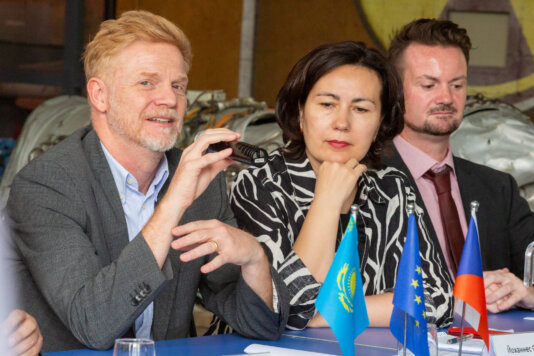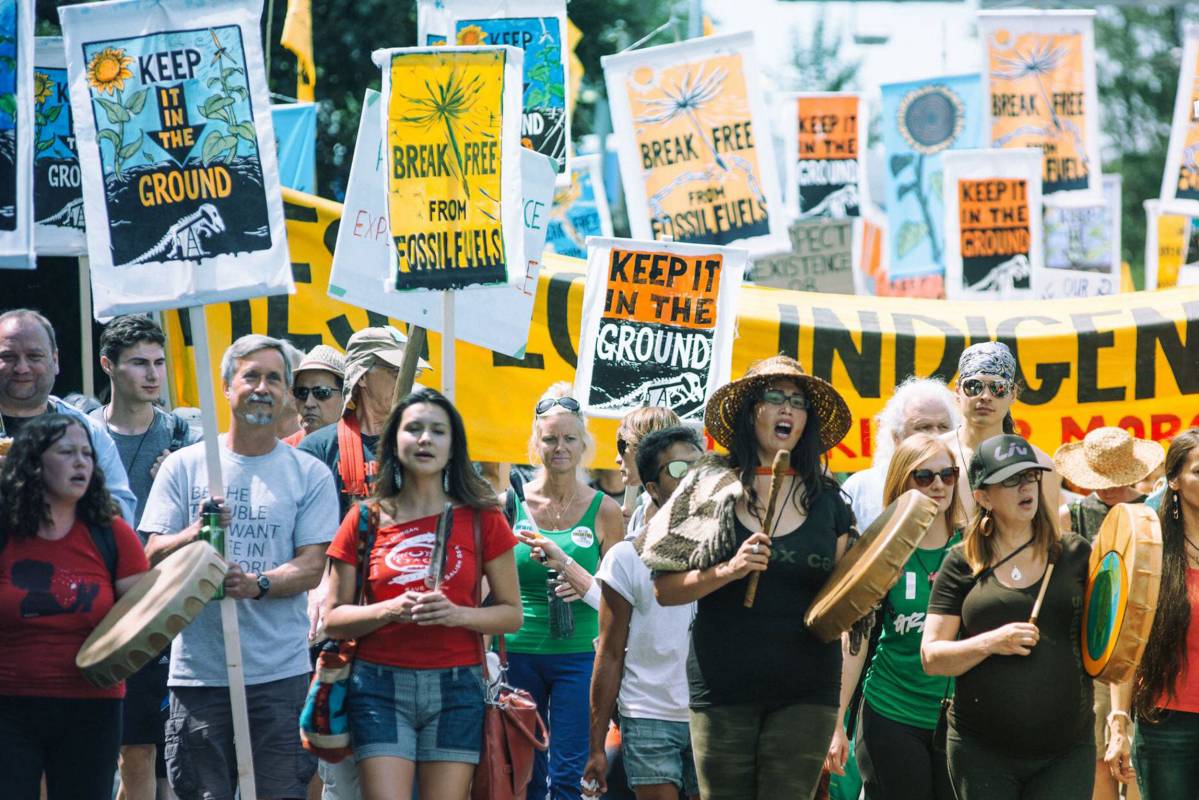- About
- Topics
- Picks
- Audio
- Story
- In-Depth
- Opinion
- News
- Donate
-
Signup for our newsletterOur Editors' Best Picks.Send
Read, Debate: Engage.
| June 30, 2022 | |
|---|---|
| topic: | Climate action |
| tags: | #kazakhstan, #climate change, #renewable energy, #coal power plants |
| located: | Kazakhstan |
| by: | Magdalena Rojo |
Kazakhstan is among the world's largest polluters. In 2020, the country emitted 524.47 tons of CO2, which accounted for 0.84 percent of global emissions.
In alignment with the 2016 Paris Agreement, Kazakhstan pledged to reduce its greenhouse gases emissions by 15-25 percent by 2030.
Arnika, a Czech NGO promoting environmental justice, has teamed up with the Kazakhstan-based EcoMuseum to launch a new EU-funded project that will help facilitate the first steps towards implementing Kazakhstan's ambitious emissions reduction goals.
FairPlanet spoke to Dmitriy Kalmykov, EcoMuseum’s development director, and Martin Skalsky, Arnika's co-founder and coordinator of projects in countries of the former the Soviet Union about the project's objectives and challenges.
FairPlanet: How is Kazakhstan fulfilling its promises to reduce emissions at the moment?
Dmitriy Kalmykov [EcoMuseum]: It is a good thing to have such an ambitious plan. However, there is neither a real plan nor measures to implement it on a local or on a regional level. At this moment, those promises are pure political declarations. The reality is that in the last years, the volume of emissions has risen. Even reduction of the emissions by 5 percent is mission impossible for Kazakhstan at the moment.
Why does it seem to be mission impossible at the moment?
In Kazakhstan, about 80 percent of all energy production depends on coal. The country has huge deposits of coal and a very wide coal extraction industry. All our power plants are coal-fired power plants with very few alternative power plants such as hydro, solar and wind.
The Karaganda region, for example, where we are based, is a coal region. There are tens of coalmines and coal power plants. Coal is also used in technological processes to manufacture all kinds of metals that are being produced in the region. These things are impossible to change in 5 to 10 years, especially without any proper plans in place.
We understand that for this reason you are going to be engaged in a collaborative project with Arnika over the next two years to bridge the gap between the promises made by the Kazakh government to the international community and the implementation of steps that could lead towards fulfilling these promises.
How exactly did this cooperation between EcoMuseum and Arnika coma about?
Martin Skalsky [Arnika]: Industrial regions of Kazakhstan have somehow similar problems to those in industrial regions of the Czech Republic, only the extent of the problems is much larger as the country is much larger.
In the 19th century, coal was a progressive technology, and so Czechoslovakia was focusing on the coal industry for a long time, too. And while it was a top industrial technology at some point, now it is really outdated. And because we were not investing enough in any type of modernisation or any kind of transition to better the technologies, we see serious consequences of the coal industry nowadays.
How exactly is your project tackling the situation in Kazakhstan you both just described?
Martin Skalsky: We do not have any big ambitions, because it is not possible to resolve serious problems like these in two years, which will be the duration of the project. What we see is that the stakeholders do not understand the seriousness of the situation.
Public officials, municipalities, even ministries and top state officials do not see climate change as an important issue. They do not even think that the transition of economies is possible. The old fashion thinking that oil and coal is something that brings money and we do not need to change it is very deeply rooted in Kazakhstan.
We are a little bit ahead in the Czech Republic in this regard. We already see social issues that climate change causes. It also blocks regions from development, because if you have big factories somewhere, you attract labour to the city instead of young families with kids or educated people.
Will you bring positive examples of transformation from the Czech Republic to Kazakhstan?
Yes. We will try to bring some people from the Czech Republic to Kazakhstan to give examples of possible solutions to local stakeholders. We will also communicate successful stories from other European countries. So our main goal is to inform people, show them that making a change is possible; to make them be open to new ways of thinking.
Dmitriy Kalmykov: We want stakeholders to start talking about climate change and to understand that promises that were made are not possible to reach, however, we still need to act.
"Our main goal is to inform people, show them that making a change is possible."
How amenable are the Kazakh authorities and private business sector to changing their mindset in this regard?
Dmitriy Kalmykov: Kazakhstan has two faces. On the one hand, it wants to impress Western society as a very democratic, open country that wants to conduct reforms, including climate reforms.
On the other hand, our authorities and businesses act as if they were in the 19th century. I'll give you an example: the carbon border adjustment mechanism. To put it simply, from 2023, all importers must pay for the emissions of CO2 from all the goods that they import into Europe. If Kazakhstan exports its goods to Europe, it must pay for each ton of CO2. Kazakh businesses started to be interested in CO2 emissions and asking themselves how they would export to Europe. One part of the exporters came with an idea to export their goods to China or India and thus forget about the carbon taxes.
What is the position of environmental NGOs in Kazakh society? How seriously are you being taken into consideration in climate discourse and policy-making?
I'll give you another example: There are 1.3 million inhabitants in the Karaganda region, but only about 20-30 environmental activists. Civil society in Kazakhstan in general is very weak. Historically, the population has been very passive and tends to agree with authorities.
Can the status of NGOs pose a challenge for you in implementing the project? If so, how will you try to overcome it?
Another reason why we invited Arnika is to give an importance to the project by making it international. Together, we will launch campaigns to raise awareness through websites and educational courses. We will organise trainings and round tables for decision-makers and media representatives. We will try to develop network of stakeholders.
But our main goal is to create a permanent working group for climate change response. This working group will involve local authorities, local businesses and civil society members. This group should, in the end, develop a plan to tackle climate change and to adopt the economy to changes that are to come.
How are you going to communicate the benefits of tackling climate change? Can you name any examples from the Czech Republic?
Martin Skalsky: The Czech Republic is facing quite serious problems in relation to climate change. People start to listen because we have droughts, a lack of underground water and quite extreme weather. All these issues are affecting farmers, life in villages and people in private houses that can be damaged by some strong winds, but also insurance companies, for example.
People now do understand that climate change has serious consequences that also affect the economy. So one approach is explaining the negative effects of climate change that can be avoided. However, explaining this to the authorities truly is a tricky part of the project.
How so?
Dmitriy Kalmykov: People in Kazakhstan do not understand that the local problems we have are consequences of climate change. There is also very little data on the impacts of climate change in the country. That is why we will not only do the campaigns. At the beginning of the project, we plan to make simple projects so that the stakeholders understand the impacts of climate change on the local economy and ecosystem.
We will introduce a set of simple possible measures to combat climate change impacts and adapt the local economy to their consequences. For example, modernisation of heat insulation of small houses or schools. The solutions we will present are mostly aimed at small and medium businesses.
Are any of the big polluters - namely big private businesses - going to be invited to partake in the project?
Martin Skalsky: One of the major problems of the Karaganda region is the outdated technology in the coal mining and coal burning industries. And that is something that we cannot avoid addressing. The factories in Karaganda are seventy years old, and no investment has been done in them.
The situation was similar at factories in Ostrava, Czech Republic, some twenty-thirty years ago. It used to be an industrial, dirty place, where it was impossible to breathe. The snow was black in the winter.
These are also the examples we need to talk about within the project. So we will continue criticising the big companies just like we did before, but we will also try to find ways to communicate and deal with them.
"The solutions we will present are mostly aimed at small and medium businesses."
One argument people often make when you talk to them about transitioning economies from coal mining to greener energy sources are socio-economic issues, such as loss of jobs, that would inevitably erupt. How do you argue against this?
Martin Skalsky: In some cases, the only thing you can do is to close the industry. Coal is an outdated technology and it does not make sense to invest in it. However, other industries, such as metallurgy and other heavy metal industries, still have alternatives in the form of new existing technologies.
Transitioning is always difficult because the owners are usually foreign companies or global companies that are used to taking all of the [profits] out of the country. And the local governments do not set up any strict conditions [for their activities].
Can you give an example of a new economic activity that Kazakhstan could adopt over time?
Martin Skalsky: It can be anything. It only depends on the fantasy. For example, I would not expect that Estonia could become a center of IT. They had large unemployment rates and did not have many resources. The country is very small and it was difficult to think about anything traditional [around which they could create a new industry].
The strategy to make Estonia a hub for IT business was probably based on analysis, but it may very well had been just a risky step taken to fulfill somebody's fantasy. It worked out, though.
Kazakhstan needs a slightly different approach. It is a huge country, where each region is unique and offers different opportunities. However, there are so many new types of industries, business, economic activities that can be somehow developed here. This is something that he working group could work on. They could come up with a vision for Karaganda region based on its potential.
Dmitriy Kalmykov: Even though the government has not thought about a green transition yet, they have been introducing other industries, such as car production and locomotive production, for example.
Now, they just need to take environment into consideration while a legal frame work is already in place.
Image by Johannes Plenio.

By copying the embed code below, you agree to adhere to our republishing guidelines.
